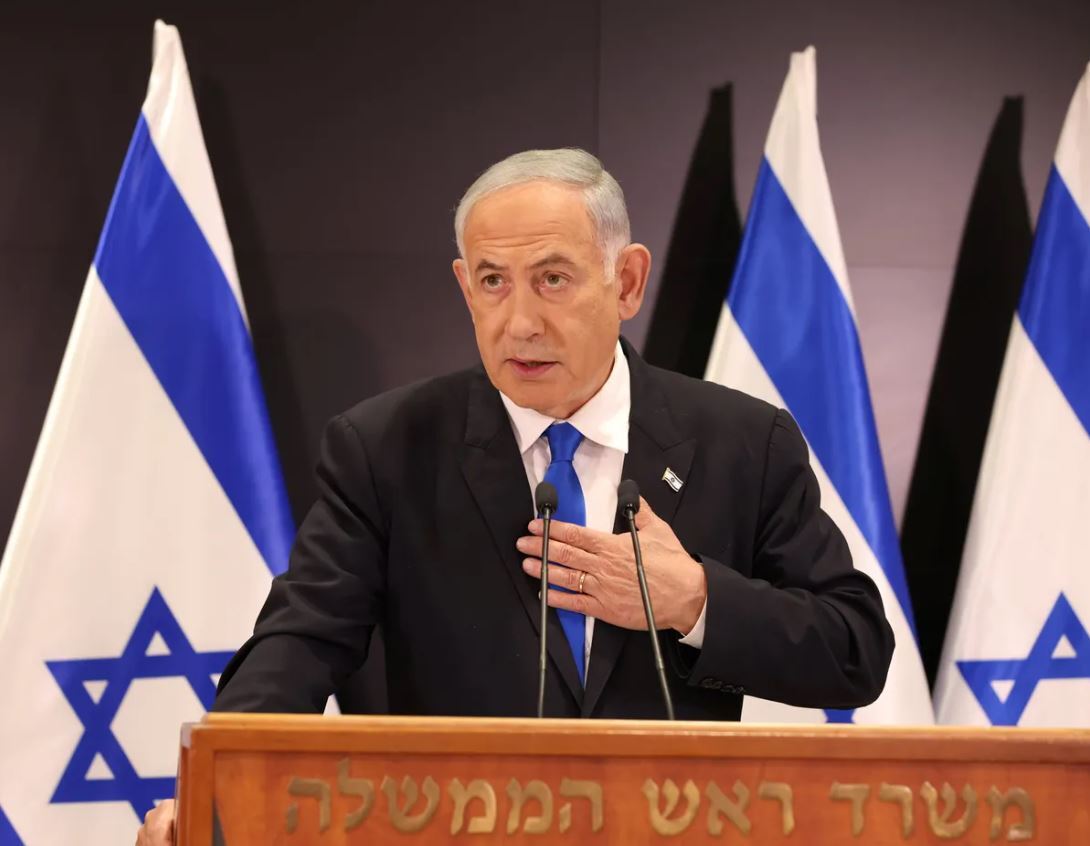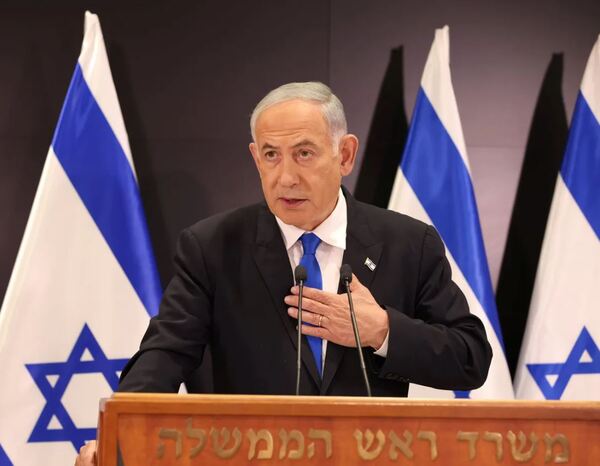ARAB AND WORLD
Sun 17 Dec 2023 4:53 pm - Jerusalem Time
Waving the "popular mandate"... Netanyahu insists on war despite the negotiator
Amid talk about the start of negotiations on a new truce, described as being “long and arduous” between Israel and Hamas, Israeli Prime Minister Benjamin Netanyahu expresses his insistence on continuing the war, saying that he is relying on a “popular mandate.”
Netanyahu is strengthened by a “popular mandate.” The Cabinet, headed by Benjamin Netanyahu, held a session on Sunday. The “Israel in Arabic” account on “X” said that he read the text of a letter from families whose sons fell during the ongoing war, in which they presented him with a “full popular mandate” to proceed. Go ahead in the fight, not to stop the battle at this stage. Strengthened by this “mandate,” Netanyahu stressed by saying: “We will continue the battle until its full goals are achieved, which are to dismantle the terrorist Hamas, return all the kidnapped people, and make Gaza a place that will no longer pose a threat to Israel.”
On the other hand, a number of the hostages' families had a different opinion. On Saturday evening, a massive demonstration headed to the headquarters of the Ministry of Defense in Tel Aviv, demanding an end to the fighting and the start of negotiations to return the remaining hostages. The demonstrators decided to sit in front of the ministry, amid mounting feelings of concern among them for the lives of the hostages, after the Israeli army announced that it had killed 3 of them by mistake during an operation to liberate them in Gaza.
Noam Peri, the daughter of hostage Haim Peri, said: “We are only receiving bodies. We want you to stop the fighting and start negotiations.” Amid actual movement towards negotiation, Reuters reported on Sunday that the head of Israeli intelligence, Mossad, David Barnea, met with the Qatari Prime Minister Mohammed bin Abdul Rahman Al Thani, in Europe, on Friday evening, as part of talk about a possible truce and an agreement to exchange detainees.
For its part, Hamas confirmed in a statement on Telegram its position “not to open any negotiations to exchange prisoners unless the aggression against our people stops once and for all,” explaining that it had “communicated this position to all mediators,” as reported by Agence France-Presse on Sunday.
Benefit from Shalit's experience
Palestinian political analyst, Talal Abu Rukba, outlines what he sees as the reasons behind Israel’s return to negotiations, despite Netanyahu’s statements regarding the continuation of the war until its full goals are achieved:
- Israel's operations since last October have not succeeded in freeing the hostages. This made the Netanyahu government realize that no matter how long the war continued, they would not be liberated except through negotiation.
- Hamas is good at hiding hostages, and it previously had experience when it hid the Israeli soldier, Gilad Shalit, from the date of his capture in 2006 until his release in 2011 in exchange for Israel releasing Palestinians (with Egyptian mediation).
- Netanyahu wants to get rid of the pressure of the hostages' families and calm the tense street, especially since the dispute is growing over the feasibility of the war, which did not succeed in liberating the rest of the hostages or eliminating Hamas.
Increasing pressures
The American researcher in international affairs, Irina Zuckerman, believes that eliminating the infrastructure of the Hamas movement can be achieved through the ongoing Israeli ground operation in Gaza, but it is “ineffective” in the issue of liberating the hostages.
She also attributed this to the skill of the Palestinian factions in hiding the hostages. She said that the hostages are separated from each other, and they are likely to be transported through the tunnel network from one place to another, which is a vast network that is difficult to penetrate, and its destruction may lead to the death of the rest of the hostages.
One of Tel Aviv's motives for accepting a return to negotiations, according to the American researcher, is the pressure placed on it from Washington, other countries, and the families of the hostages, adding that "the more time passes, the pressure increases, in order to preserve the lives of hostages who are at risk of being killed in accidental operations, or due to health conditions, or stress. Or lack of nutrition, or something else.”
The Hamas movement announced the killing of 60 hostages before the humanitarian truce that took place between it and Israel from November 24 until the morning of December 1, in an Israeli bombing of the Gaza Strip.
After the truce, Hamas and Israel continued to announce the killing of a number of other hostages from time to time during bombing, or by mistake, or in circumstances that were not announced.
Prisoners' file in numbers
- On Friday morning, December 1, a week-long truce between Israel and Hamas ended with Qatari-Egyptian-American mediation, during which 84 Israeli children and women were released, in addition to 24 foreigners detained by Hamas, while Israel released 240 Palestinian prisoners (71 women and 169 children).
- Israel demanded the release of women it claimed were civilians, which Hamas rejected, stressing that they were female soldiers who had been captured in military uniform. It considered the request to be in violation of the terms of the truce agreement, on the basis that negotiations on the release of the soldiers would take place at a later stage.
- Hamas still has 137 detainees, including 126 Israelis and 11 foreigners.
Source: Sky News






Share your opinion
Waving the "popular mandate"... Netanyahu insists on war despite the negotiator